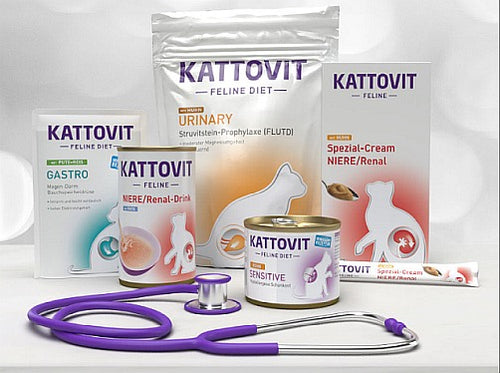Newsletter
Subscribe to Newsletter
Stay informed and always up to date with KATTOVIT. Be the first to hear about new products, discounts, advice texts, etc.
Schon ab 30€ ist deine Bestellung versandkostenfrei!
Mit deiner Anmeldung erklärst du dich mit unserer Datenschutzerklärung einverstanden.

Mit deiner Anmeldung erklärst du dich mit unserer Datenschutzerklärung einverstanden.
Cart
Your cart is empty
KATTOVIT Sensitive is our special food for cats with food intolerances. High-quality ingredients, a gentle recipe based on the latest veterinary findings and over 40 years of experience ensure optimal tolerance - even for sensitive cats.
Filters
Filters
Top Bewertungen
Gutes Produkt, unsere Katze hat es gut angenommen.

Meine Katzen lieben das Futter und endlich bleibt auch die Hälfte nicht mehr übrig. Ich würde mir wünschen,dass es mir Mixpakete gibt, insbesondere bei Sensitive-Futter. Danke

So sind wir bei Kattovit gelandet, Danke Kattovit, meinen Katzen geht es schon viel besser!

Zum Ausprobieren ist es echt top und sehr preiswert, unsere Katzen lieben es!

Your Questions - Our Answers
frequently asked Questions
Cats that react to food with allergies or intolerances do not have to go hungry in future. As soon as you have found out what your pet reacts to, you can adjust the diet accordingly. Extra-sensitive cat food is particularly suitable - this is available as wet and dry food and in various flavors, all of which are made for sensitive stomachs.
It can take several weeks for a change in diet to take effect. Depending on the severity of the allergic reaction or intolerance, it can take up to twelve weeks for your cat's body to regain its balance. Even if improvement seems to be in sight quickly, you should still show some consistency. It takes a little time until the irritation is over. Be patient - your velvet paw will thank you for it.
Feline asthma usually results from an allergy. When the cat comes into contact with the allergen, i.e. the intolerable substance, for the first time, the immune system immediately produces antibodies. These bind to certain immune cells - more precisely to the mast cells and the so-called basophilic granulocytes. Upon renewed contact with the allergen, the allergen and the antibodies reach the mast cells and granulocytes, which in turn release pro-inflammatory substances. So while the immune system actually pulls out all the stops to fight the allergen, it actually triggers an overreaction in the body. The body's own substances that cause the inflammation ultimately ensure that the bronchial tubes constrict considerably. This is caused by mucus deposits and cramps in the muscles and can be felt by the cat in the form of breathing difficulties.
Asthma is a chronic disease of the airways that usually occurs in the form of acute attacks with shortness of breath. If the shortness of breath remains untreated, an asthma attack can become life-threatening: As the cat's immune system overreacts, anaphylactic shock occurs and, in the worst case, the circulation collapses or the organs can fail. If you notice that your cat is experiencing difficulty breathing or other symptoms such as coughing, exhaustion or discoloration of the mucous membranes, you should therefore consult a vet as soon as possible. Although asthma cannot be cured, suitable therapy can alleviate the symptoms. As asthma is usually an allergic reaction, it is also important to find the trigger and remove it from your cat's environment.
If your cat has diarrhoea, observe it closely and try to determine the cause of the diarrhoea. Possible causes are stress, food intolerance, a sudden change of food, poisoning, parasite infestation, an infection or a more serious illness. You should initially keep an outdoor cat indoors so that you can observe it more closely and rule out possible sources of danger outdoors. If the diarrhoea occurs only once and your cat otherwise appears normal, you should not worry too much. Make sure your cat feels comfortable and drinks enough and offer him a light diet. If your cat's diarrhoea lasts longer than 24 hours and the animal shows other symptoms and behavioural abnormalities, you should definitely consult a vet.
Diarrhoea in cats can be caused by many different things. Your cat's stomach can react sensitively to the wrong food without there being anything more serious behind it. Stress and major changes in your cat's life can also cause diarrhoea, as can parasite infestation, a food allergy/intolerance, poisoning, an abrupt change of food, an infection or a serious illness. A supply of sufficient drinking water and a light diet are now essential. If the diarrhoea lasts longer and is accompanied by other symptoms, you should definitely take your cat to the vet and have the causes professionally investigated.
If your cat has diarrhoea, it is important to feed it a gentle diet to avoid further irritating its stomach. You can prepare easily digestible, low-fat food such as boiled chicken, turkey, unseasoned rice or mashed potatoes. You can also buy diet food tailored to cats with digestive problems and special food for cats with food intolerances from specialist retailers.
If you notice that your cat is self-inflicting hair loss, it is very likely to be 'FSA - feline self-induced alopecia'. There can be various reasons why the animal removes its fur by licking excessively frequently and intensively. Itching is often behind it, which in turn can indicate a parasite infestation, fungal skin diseases or allergies - but this is by no means the only conceivable cause. Compulsive cleaning behaviour triggered by stress, psychogenic lickalocepia, can also be responsible for the constant licking. As soon as your cat's behaviour becomes conspicuous, it always makes sense to seek medical help in order to correctly interpret the symptoms and take effective action against them in the next step. Firstly, you can take care to eliminate stress factors to improve your cat's well-being.
The answer to this question is quite simple: yes. Lick-induced hair loss in cats often occurs in patches, which is why - as in humans - it is also referred to as circular hair loss. Various accompanying symptoms can provide information about the disease behind the hair loss. Consult a vet to obtain a diagnosis and start treatment promptly.

Newsletter
Subscribe to Newsletter
Stay informed and always up to date with KATTOVIT. Be the first to hear about new products, discounts, advice texts, etc.
Proven Quality
Tested quality based on the latest veterinary findings
Always fresh
Guaranteed freshness, direct from the manufacturer - for the best care for your pet.
40 years of experience
More than 40 years of experience and expertise in the production of high-quality animal feed.